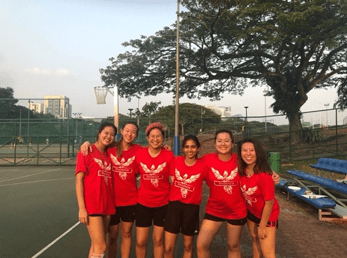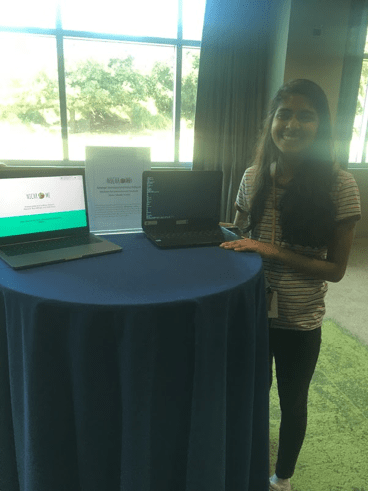What is it like going on an overseas research programme, and what do people actually do in a research programme? Should you apply for one? In this post, we speak with an exchange pos-graduate student from the United States, Ananya Joshi, about her work in Singapore and her future plans.
Source: Lydia Gan
Tell us a bit about yourself.
My name is Ananya Joshi, I’m 22, and I’m here as a researcher from the Fulbright programme . I’m in the SDE (School of Design & Environment) department, but my background is in computer science.
This is an independent research, but next year I will go to Carnegie Mellon University in United States to start my Ph.D., which will take about five years.
Why did you choose to get a Ph.D. in the first place?
I knew I really liked research and I want to learn as much as possible. I think that a Ph.D. will let me be free of some constraints, like worrying about the profitability of my work. I’m really thankful I got accepted into the Fulbright programme so I can do the research I care about, and I believe the research will be helpful to the world.
Could you explain this programme to us?
This Fulbright programme I applied for is separate from my Ph.D. It has grants all over the world, but I applied for an urban planning researcher position in Singapore. It’s supposed to be a research and cultural exchange programme, allowing you to go to a different country. They sponsor you for a year and provide you with a lot of resources. In my opinion, the main goal of such a programme is to foster connection between countries. So one of my goals professionally is to foster a relationship between Singapore and US by doing research and collaborating. A personal way I can do that is also just by just meeting people around campus, sharing with them a little bit about the US, and learning about Singapore at the same time.
The Fulbright Student Researchers
We understand that you’re currently staying in the College of Alice and Peter Tan (CAPT). Did you choose to stay in CAPT?
No, they assigned me here. It’s almost perfect that my programme fits the cultural mission within CAPT, as the programme and CAPT have similar objectives (community service and awareness). An unexpectedly good fit!
How is urban planning related to your degree in computer science?
On the surface, it doesn’t look like it. But the lab that I am working for is specifically combines data science and urban science. It’s called the BUDs (Building and Urban Data Science) lab, and they use a lot of computer science and algorithm techniques in order to make urban environments better for humans.
What role do you take on?
I’m learning how to use the data that is specific to Singapore, as well as some new computer science techniques. My project is on dengue, and I use a lot of the same data processing techniques that the lab uses. For example, we can use techniques to predict environmental qualities in urban planning. The same data processing techniques can be applied to different purposes. In my case, it would be on how to track mosquitoes.
Will this be related to your PHD?
The goal is to take those underlying data processing techniques I’m learning and then apply it to my Ph.D. The good thing about the Ph.D. is that it’s an exploratory process. Hopefully I will be able to merge some of the work I’m doing now with the work I’ll do in the future.
Describe a typical workday.
I’m really lucky that the nature of the work in my lab is flexible – there is no typical day.
For example, today, I spent the morning researching mosquito collection sites around Singapore. For my research I need lot of data, and it so happens that Singapore already collects this data. I emailed the government agencies who have the data to request this data. In the afternoon, I spent time working on the machine-learning algorithms with data I already gathered. And at night, I’m going to update my blog with various research ideas.
It goes against my misconception that researchers sit at their computers all day. My project forces me to go out and talk to people and make connections, because you can’t just solve problems sitting all the time in a lab. Gathering different perspectives is actually my favourite activity in research and it’s the best way I get information.
How often do you go into the lab?
Three to four times a week. I also visit scientists in industry and government and work outdoors.
What is the most challenging part of what you do now?
I struggle knowing that my research will never be perfect. I can never reach a 100% rate of no dengue zones in Singapore, no matter how hard I try. Being realistic about the implications of my project is hard. Also, understanding how mosquito control in Singapore works is challenging. There is the cultural aspect I need to understand it before I can propose a solution that works.
What are you most looking forward to?
My personal goal is to develop a software that the government or the commercial industries can use to help the citizens. It would be a dream come true if this research contributes to improve our lives some fashion.
Ananya’s mosquito breeding ground detector (research)
Any advice for hopefuls looking to pursue a Ph.D., or just a research programme?
Most importantly, go ahead and do it. Don’t be afraid to fail. I have failed so many times – with research, with studies – but I feel like each time I took a risk or experienced failure, it helped me to learn something vitally important.
What has been your biggest takeaway so far?
It’s really important not to make assumptions and to listen to the end users, the people your work is intended for. Listen to your customers effectively. Understanding the country and how to best serve its people is far more important than all the computer science and technology to create a good product.
Ananya at CAPT Tennis
Name one thing you like and one thing you dislike about Singapore.
One great thing is that people are really open. I felt very welcome as soon as I got here, which I wasn’t expecting. I feel very comfortable talking to people and expressing opinions or having debates. But, I struggled with the haze at first!
CAPT Soccer
NUS Indian Dance/Singing Performances
A Computer Science Research Demo Ananya did a few years back
All other pictures: Ananya’s own
We’re so glad that we managed to chat with Ananya to understand more of what an overseas research programme entails. Are any of you intending to go on an overseas research programme soon, or have also gone? Tell us about your plans in the comments!







